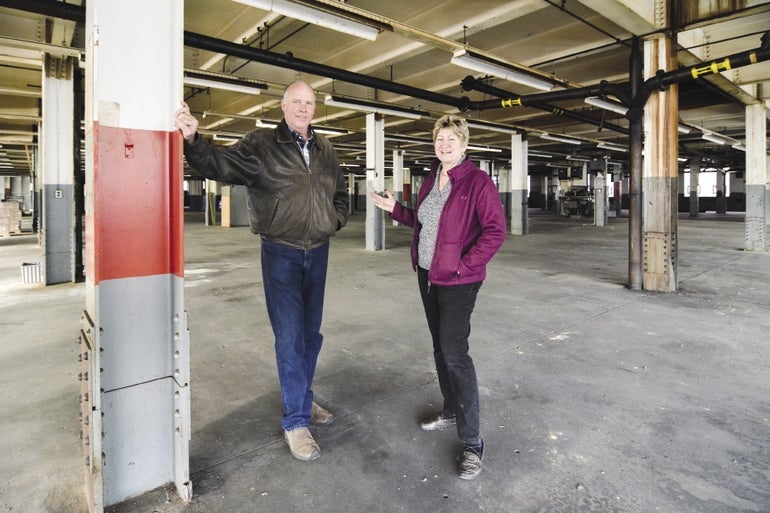Decades have passed since the Union Twist Drill building, a massive 360,000-square-foot mill on the Millers River, was the economic hub of Athol.
Now, the century-old building is nearly entirely vacant, save for an office and a few areas where warehoused goods are stored.
It’s now owned by L.P. Athol Corp., an entity founded by now 93-year-old Bill Purple, a former mill worker. He purchased the building in when it closed in 1986 for $855,000 and since then, he, his daughter Cindy Hartwell and son-in-law Chuck Hartwell have been working to attract tenants to occupy the iconic building that once represented the Central Massachusetts’ manufacturing industry.
For the last several years, the family has been working with a developer to transform the massive space into a mixed-use development of apartments and commercial space.
But a new opportunity is on the horizon, one that could make Athol and the Union Twist Drill building the center of a state industry expected to grow from $52 million to $1 billion by 2020: marijuana.
A massive grow facility
Two groups, Herbology Group, Inc., a nonprofit that holds a provisional license for the facility, and medical marijuana company Sea Hunter Therapeutics, want to renovate and operate one of the largest pot-growing facilities in the state out of the building, potentially bringing hundreds of jobs back to the facility and Athol.
Robert Liedy, representing Sea Hunter Therapeutics, asked the Board of Selectmen for a letter of non-opposition in October. Once fully up and running, the facility could bring up to 500 jobs to the region, he said.
The building, he said, is uniquely suited to meet the needs of the facility. If all goes as planned, the company would develop at least 150,000-square-feet of the mill to begin, with the hopes of expanding to occupy the entire mill.
No dollar figure was presented, but millions of dollars would be invested to renovate the property, and existing hydropower turbines will be renovated to provide power for the facility, which will require a large amount of electricity, Liedy said at the meeting.
The building is currently surrounded by natural features, water, a railroad and topography that make it secure, but substantial improvements would be made to ensure maximum security, Liedy said.
Medical & recreational
At the moment, Sea Hunter is only looking to grow marijuana for medicinal purposes out of the build, although Liedy did not rule out tapping into the recreational market as well when he talked to selectmen.
While the processes for medical marijuana are already in place, the regulations for growing and selling recreational marijuana are still in development since the drug was legalized for recreational use in November 2016.
Companies can begin applying to grow and sell recreational marijuana on April 1, according to the Cannabis Control Commission. The process for recreational marijuana companies would be the same for new medical marijuana businesses.
Tapping into both recreational and medical would give Sea Hunter a huge market advantage. The medical marijuana industry in Massachusetts totaled $52 million in 2016 and is expected to be $100 million in 2017, according to Washington, D.C. data analytics company New Frontier Data.
But the total marijuana market is expected to be $1.1 billion by 2020, with roughly 75 percent of that coming from recreational use, according to New Frontier Data.
The opposite of a ban
Despite the earliness of the process and the possibility that this exciting opportunity may not become a reality, the town is excited to repopulate the mill with workers.
When the mill closed, the region lost nearly 700 jobs, said Town Manager Shaun Suhoski.
“That was a big hit when those jobs went out,” he said.
Suhoski has been working with Purple and the Hartwells to find a tenant for the impressive structure. Currently, that means a letter of non-opposition the board approved last month and a Host Community Agreement that has not yet been approved.
If the groups go forward with the endeavour, they’ll join a growing list of 248 medical marijuana establishments that have either submitted applications, withdrew or are currently operating grow sites or dispensaries.
Athol’s courting of the marijuana grow facility is in stark contrast to other communities’ approach the formerly illicit drug. At least 11 communities in Central Massachusetts – including Ashland, Marlborough, Hopkinton, Millbury and Shrewsbury – have placed moratoriums or outright bans on any recreational marijuana facilities within their borders.
The marijuana facility has faced little opposition in Athol among town officials or residents – the letter of non-opposition was passed by the Board of Selectmen passed 4-1 – as supporters want one of the town’s abandoned buildings to become active again.
No deal has been struck and the discussions are still in the early stages, but the opportunity is nonetheless exciting for the Hartwells and the town.
“We were thrilled,” Cindy Hartwell said of the possibility of bringing hundreds of jobs back to her hometown.
Purple, her father, said he’s hoped the mill could one day help sustain the town and boost its local economy.
“Hopefully we’ll find a way to make it happen,” he said.

